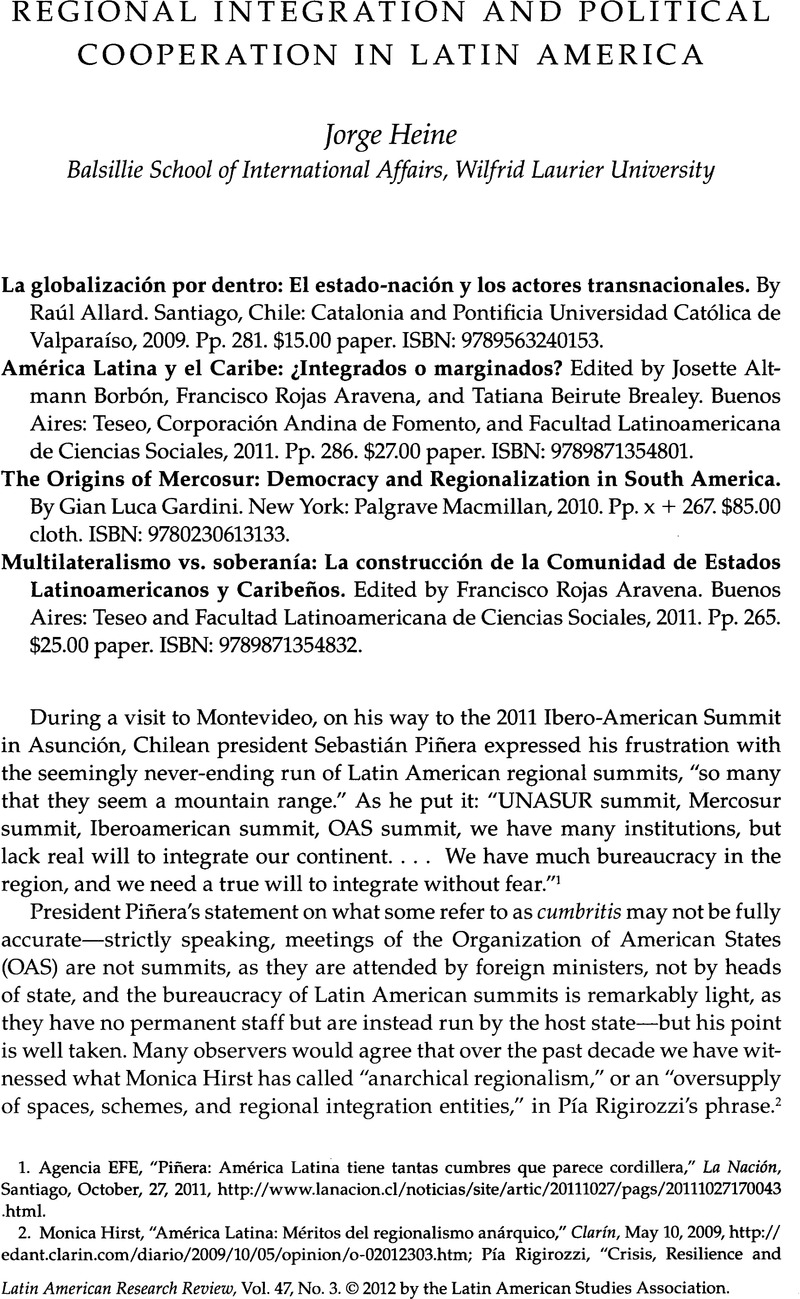Published online by Cambridge University Press: 05 September 2022

1. Agencia EFE, “Piñera: América Latina tiene tantas cumbres que parece cordillera,” La Nación, Santiago, October, 27, 2011, http://www.lanacion.cl/noticias/site/artic/20111027/pags/20111027170043.html.
2. Monica Hirst, “América Latina: Méritos del regionalismo anárquico,” Clarín, May 10, 2009, http://edant.clarin.com/diario/2009/10/05/opinion/o-02012303.htm; Pía Rigirozzi, “Crisis, Resilience and Transformation: Regionalism beyond Europe,” paper presented at the conference “El regionalismo en América del Sur: Globalización desde el Sur o continuación de la política nacional por otros medios?,” Facultad Latinoamericana de Ciencias Sociales—Argentina, Buenos Aires, June 29, 2010.
3. The origins and implications of CELAC are dissected by José Antonio Zabalgoitia (Altmann Borbón, Rojas Aravena, and Beirute Brealey, 145-153).
4. A key source is Raúl Bernal-Meza, Sistema mundial y Mercosur: Globalizatión, regionalismo y políticas exteriores comparadas (Buenos Aires: Grupo Editor Latinoamericano, 2000).
5. Comisión Económica para América Latina y el Caribe, El regionalismo abierto en América Latina y el Caribe (Santiago: Naciones Unidas, 1994), 9.
6. On the Central American Common Market, see Rafael A. Sánchez Sánchez, The Politics of Central American Integration (New York: Routledge, 2009); Luis Roniger, Transnational Politics in Central America (Gainesville: University Press of Florida, 2011). On CARICOM, see Anthony J. Payne, The Political History of CARlCOM, rev. ed. (Kingston, Jamaica: Ian Randle, 2008).
7. I develop this argument in “Between a Rock and a Hard Place: Latin America and Multilateralism after 9/11,” in Multilateralism under Challenge? Power, International Order, and Structural Change, ed. Ramesh Thakur, Edward Newman, and John Tirman (Tokyo: United Nations University Press, 2006), 483-501.
8. Together with the other volume reviewed in this essay, América Latina y el Caribe, edited by Altmann Borbón, Rojas Aravena, and Beirute Brealey, Rojas Aravena's Multilateralismo vs. soberanía? is part of an ambitious six-volume set on Latin American international relations published in 2011 by Teseo in Buenos Aires for FLACSO, in conjunction with a number of other entities such as Spain's Fundación Carolina and the Corporación Andina de Fomento. The set includes Francisco Rojas Aravena and Andrea Alvarez, eds., Gobernabilidad democrática, política, ciudadanía, exclusión, memoria y demografía; Francisco Rojas and Tatiana Beirute, eds., Nuevas formas de cooperación: Las dimensiones Sur-Sur; Josette Altmann, ed., ALBA: Una nueva forma de integración regional?; and Josette Altmann and Tatiana Beirute, eds., Cooperación transfronteriza: De territorios de división a espacios de encuentro. The books provide a very useful and up-to-date overview of some key regional issues, on which the literature available in English is far behind.
9. Andrew F. Cooper and Jorge Heine, eds., Which Way Latin America? Hemispheric Politics Meets Globalization (Tokyo: United Nations University Press, 2009).
10. One of the strongest critics of FTAs is Jagdish Bhagwati, Termites in the Trading System: How Preferential Trade Agreements Undermine Free Trade (Oxford: Oxford University Press, 2008).
11. On how UNASUR fits into the overall design of Brazilian foreign policy, see Amaury de Souza, Agenda internacional do Brasil (Rio de Janeiro: Elsevier Editora, 2009); Sean W. Burges, Brazilian Foreign Policy after the Cold War (Gainesville: University Press of Florida, 2009); Tullo Vigevani and Gabriel Cepaluni, A política externa brasileira: A busca da autonomia de Sarney a Lula (São Paulo: Editora UNESP, 2011). On Venezuela's foreign policy, see Andrés Serbin, Chávez, Venezuela y la reconfiguración política de América Latina y el Caribe (Buenos Aires: Siglo Veintiuno, 2010).
12. On these expectations, see Abraham F. Lowenthal, Theodore Piccone, and Laurence Whitehead, eds., The Obama Administration and the Americas: Agenda for Change (Washington, DC: Brookings Institution Press, 2009). For a preliminary, first-year assessment, see Jorge Heine, “A Case of Missed Opportunity,” The Hindu, December 23, 2009. For a two-year assessment, see Cynthia Arnson (in Altmann Borbón, Rojas Aravena, and Beirute Brealey). For a longer-term perspective on the changing nature of US-Latin American relations since 2000, see Jorge I. Domínguez and Rafael Fernández de Castro, eds., Contemporary US-Latin American Relations: Cooperation or Conflict in the 21st Century (New York: Routledge, 2010); Gordon Mace, Andrew F. Cooper, and Timothy M. Shaw, eds., Inter-American Cooperation at a Crossroads (Basingstoke, UK: Palgrave Macmillan, 2011).
13. See Robert Jervis, Perception and Misperception in International Politics (Princeton, NJ: Princeton University Press, 1976); Alexander Wendt, “Anarchy Is What States Make of It,” International Organization 46, no. 2 (Spring 1992): 391-425; Judith Goldstein and Robert O. Keohane, “Ideas and Foreign Policy: An Analytical Framework,” in Ideas and Foreign Policy: Beliefs, Institutions and Political Change, ed. Judith Goldstein and Roberto O. Keohane (Ithaca, NY: Cornell University Press, 1993), 3-30.